Archives
EXCLUSIVE: A Mother’s Passion Burns Bright in Tekoa: The Story of Olga Alievsky
December 7, 2017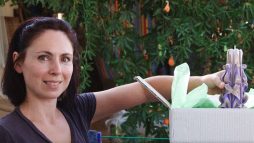
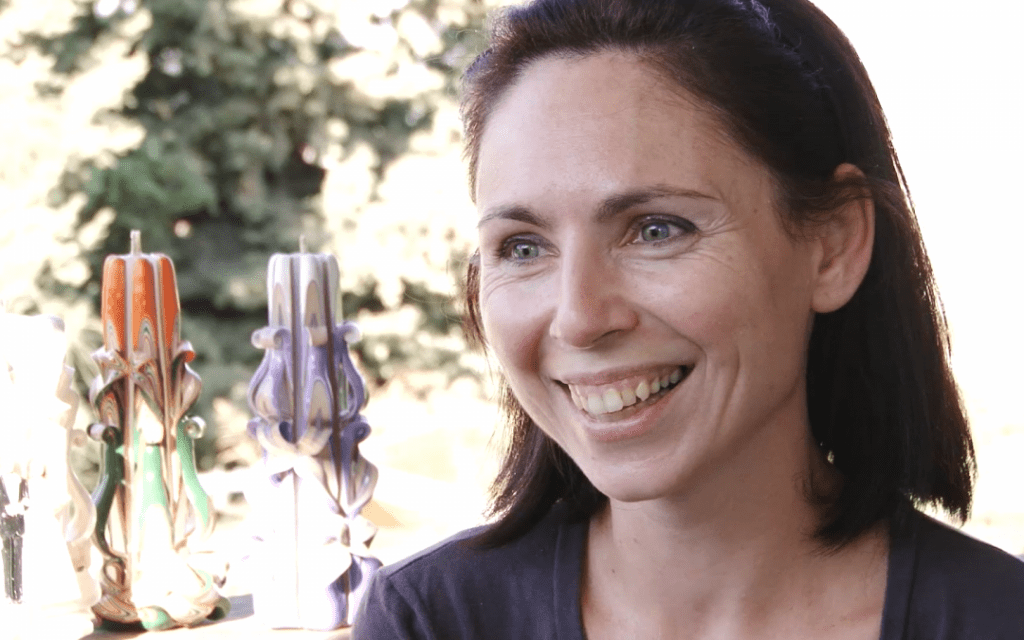
Olga is the mother of 6 children. She lives in Tekoa (pronounced T’koa) a beautiful community in the Judean Hills, just south of Jerusalem. Tekoa is part of the area of Judea known as Gush Etzion (Etzion Block). Tekoa like all the communities in Gush Etzion, is located near the historical road called Derech Avot (Path of the Patriarchs) – a road traveled by all of the Jewish patriarchs.
We traveled to Tekoa to meet with Olga, to hear her story and – although we did know it beforehand – to stand in awe by her masterpieces. Olga crafts stunning handmade candles that are bright even before being lit. Olga is truly an artist.
The work that went into creating the engraved candles designed for our Lev Haolam subscribers requires an acute attention to detail and an intuitive spark of creativity. During our interview, we discovered that Olga’s passion for candle making came much later in life. “I’ve always dreamt of being a professional artist,” Olga tells us. “I love to paint, I love ceramics. And I searched for a long time for a profession that I could make money from and a profession that I would enjoy working in.”
“By chance, I thought about candle making. I searched for as much information that I could find about candle making. And [after researching and studying the art] I began to become more talented at the art of making engraved candles. I became inspired,” Olga recalls emphatically. “And I knew that this was the profession for me.”
We then asked Olga about the quaint community of Tekoa that she now lives in and how she came to find out about it. “I’ve been living in Israel for 18 years now and I made Aliyah (immigrated) from Ukraine… I really love yishuvim (small communities in Israel) and I have searched for a long time for a community like this one. And [then] this community appeared to me. I also have [extended] family living here.”
Olga went on to tell us, “The people here are very open. We live here like a [big] family. I haven’t seen people [that are so warm and open] in any other place. Also in our neighborhood in particular, we live like a family. When I leave my house, I don’t feel the need to lock my door. This says something,” Olga continued. “[Tekoa] is also a place which is very suitable for raising children. They leave the house without fear, despite the fact that our community is surrounded by many Arabs.”
When we asked Olga about her business, she responded by telling us that it has grown. “It’s been about 4 years since I began this business. Today, I have come a long way from where I started. I now have a website which has enabled me to sell my products online. I also sell products in Israel – in Jerusalem, Tekoa. Tekoa in particular, I have been selling candles for many years and also candles for Havdalah (a post-Sabbath ceremony).”
Olga also wanted us and the subscribers of Lev Haolam to know that she was thankful for their support for her and her family. “This really helps. It helps when so many people see it [what we are doing here] and when many people recognize it [the products that we produce]. And in particular, through the support of Lev Haolam, people outside of Israel also become aware of what we are doing, which is certainly good. And it is also good for the Jewish people that live outside Israel to know that we don’t just make candles, but that we make specially engraved candles and candles for Havdalah as well.”
“I hope that with the help of Lev Haolam the business will be able to further develop, not just in Israel but also outside of Israel as well.”
Would you like to help support the families and small businesses of Judea and Samaria? Consider signing up for the Surprise Monthly Package Project today.
EXCLUSIVE: Hebron’s Holy Honeybees: The Story of David Daniel
November 22, 2017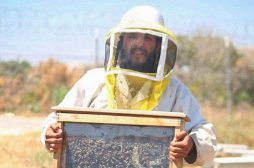
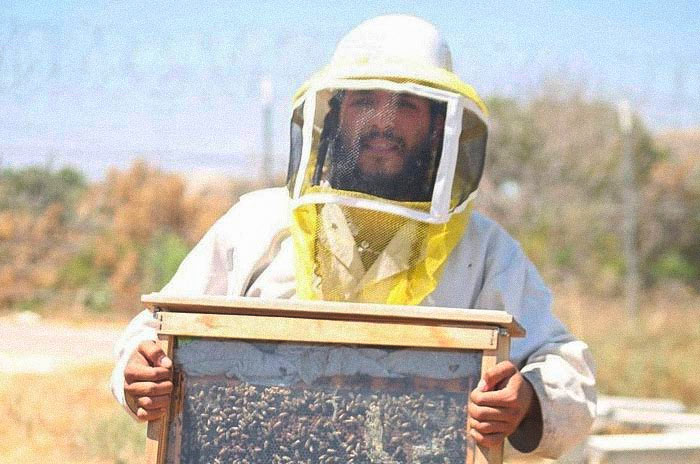
David Daniel has been a Lev Haolam supplier for a number of years. Among the many products from our Surprise Monthly Package Project, David has produced honey and therapeutic beeswax ointment for Lev Haolam, both of which come from the bee hives David owns and maintains in Hebron. His products are infused with his passion for the land of Israel. David was born and raised in the city of Hebron and currently lives there with his wife and 4 children. While it is true that David grew up in Hebron, his passion for the Hebron and for Israel goes beyond his personal history.
In an exclusive Lev Haolam interview with David, we asked him why he chose to live, work and establish his family in Hebron, David responded “the simple answer that I give is that it’s in the Bible. I open the Bible and tell them about the holy forefathers, Abraham, Isaac and Jacob and about all of the high mountainous areas around us – the places that our forefathers grew up in.”
“After 2000 years of exile, it is impossible to think of everything that has been accomplished since then. Suddenly millions of Jewish people from all over the world returned to Israel. This shows the strong connection
between the Jewish people and the land. [And] the same connection between the Jewish people and Hebron is the same connection that the entire Jewish people have with the whole land of Israel,” David told us.
David took us back in time to explain the deep and fascinating connection his family had to Hebron in particular. David told us of how his family returned to the ancestral land of Hebron approximately 30 years ago. He explained that the strong and vibrant Jewish community that once lived in Hebron had left the city in the aftermath of the 1929 Hebron massacre. During the massacre many Jews were attacked and murdered due to the incitement of leading Arab clerics. After 6-Day-War in 1967, there were many Jews who decided to move back to the community and reestablish the lost Jewish presence there. David’s parents were among these brave pioneers.
David’s primary occupation is farming and beekeeping. In addition to harvesting honey from his bees, David uses the small and versatile creatures to also help create healing ointments and balms. David started learning about harvesting bee honey and working with bees from the time he was a young child. His Father, who was also a bee-keeper, taught him how to farm and how to raise bees and harvest their honey. David’s father went to the renowned Mikveh Yisrael school – the first agricultural school in Israel. David also explained that his father had taught him the art of creating beeswax creams and ointments. “About 7 or 8 years ago, I began to seriously produce beeswax creams and offer them for sale,” David explained. “Aside from honey, it is a wonderful product with tremendous health benefits, David continued. We got a lot of positive feedback on how great and helpful the products are. Given the positive feedback from our customers, we decided to begin mass production about 8 years ago.”
In addition to being a Lev Haolam supplier David Daniel has been a friend of Lev Haolam founder Nati Rom for many years. In speaking about his first impressions and experiences with Lev Haolam, David recounted, “I started to work with Lev
Haolam, a special company. I met with Nati [the founder of Lev Haolam] in Hebron. We have been friends for many years and about four years ago, he mentioned to me that perhaps we could begin working together.””I am very pleased with the work that they are doing,” David continued. “They help support the economy of Judea and Samaria, and on top of that, they publicize the products produced in Judea and Samaria to the world. This gives strong encouragement to the mission of building communities in Judea and Samaria”
David is very thankful for the support from Lev Haolam’s subscribers. During the interview David said, “I wanted to thank the supporters of Lev Haolam who purchase [the products] from Lev Haolam. They are really helping us develop our businesses. These large orders that I get from time to time give us the opportunity to grow and move forward.”
“Lev Haolam really helps us and really gives us support financially and encouragement to continue to strengthen and build Judea and Samaria. And I wanted to say from me and my family, thank you so much!”
Would you like to help support the families and small businesses of Judea and Samaria? Consider signing up for the Surprise Monthly Package Project today.
EXCLUSIVE: The Past and the Present Come Together in Gush Etzion: The Story of Shlomit Cohen & Gift of Nature Cosmetics
November 6, 2017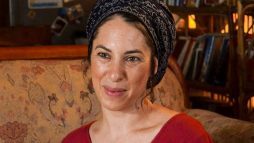
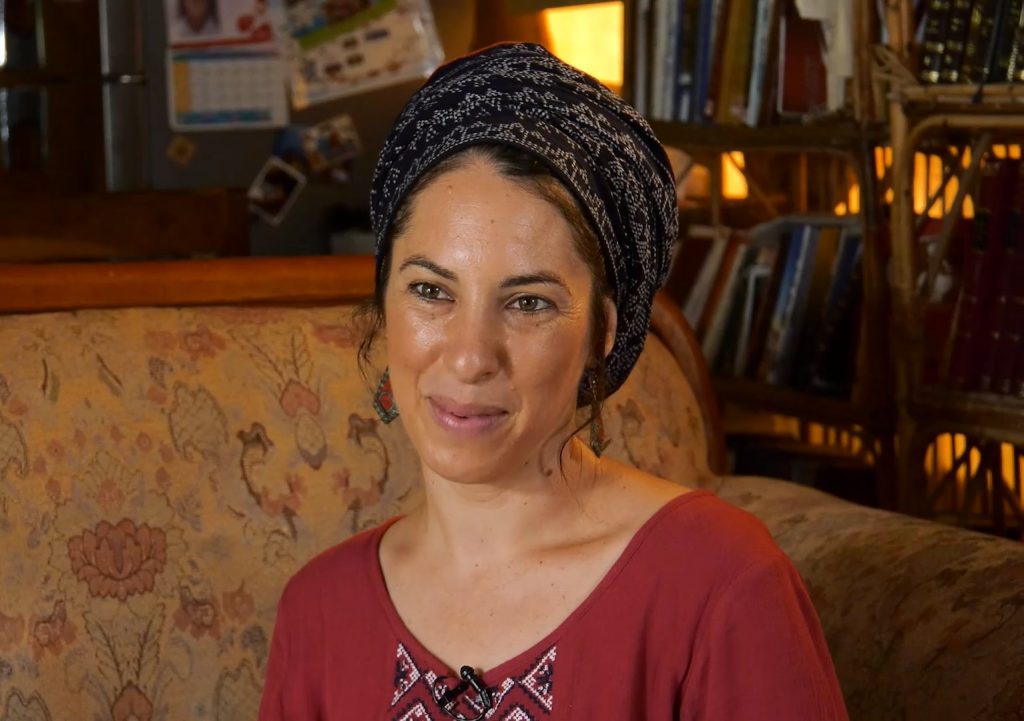
In light of all of the historical and present treasures that Israel has to offer, traveling through the area of Judea known as Gush Etzion (Eztion Block in English) is nothing short of mesmerizing. The Gush Etzion region, snugly nested within the Judean hills, is an area that starts approximately 20 kilometers south of Jerusalem and extends to just north of Kiryat Arba and Hebron. All of the communities of Gush Etzion are located adjacent and connected to a road called Derech Avot (road of the fathers). This road, which still exists, gets its name from the fact that it is the road that all of the Jewish patriarchs traveled while they resided in Israel.
The Lev Haolam recently took a trip to Gush Etzion to visit Shlomit Cohen, a resident of the Bat Ayin community and a Lev Haolam supplier. The story of Gush Etzion and the Judean Mountains doesn’t stop with our forefathers, but continues to this very day. One of the latest chapters in the story of Judea can be found in the organic products that Shlomit Cohen produces and her personal experiences that made them possible.
Shlomit told us that she and her husband decided to raise their family in Bat Ayin because they felt that the community and the environment would be best for their family. During the interview, Shlomit pointed out that the area of Bat Ayin is an area that has been inhabited by our ancestors since the first generations of Jews. “We have in Bat Ayin, archaeological remains from 1000 years ago… remains of a Cohen’s house (a Jewish priest from biblical times). Our family name is Cohen and it’s so exciting that 200 meters from here there is an old house of a Cohen.”
For Shlomit, nature is not just a profession; it is an essential part of her life. Shlomit lives in a tent that her husband built, enclosed by the beautiful and open forest of Bat Ayin. She feels spiritually connected to the land and to the community. “It’s so important to live in Judea and Samaria because it is our home; it is the home of our Mothers and Fathers. It has been the Jewish home throughout the generations,” Shlomit said. About Bat Ayin in particular, she told us, “I found that it is a good place to raise my children and my family… I feel like a tree and my roots are here – this is my place to grow.”
Upon moving to Bat Ayin with her husband and falling in love with the community, Shlomit would often collect flowers and plants and learn everything there was to know about each one. She would also take the plants home and teach her kids about what she had learned. She continued to refine her interest in plants and flowers for many years. While taking care of her newborn children (whom she stayed at home with until each one was 3 years old), she decided to take lessons and more advanced courses about essential oils and natural remedies. In pursuing her interests, she also wanted what she learned to be something of interest to her children and something that she could share with them, as her father did with her when she was growing up.
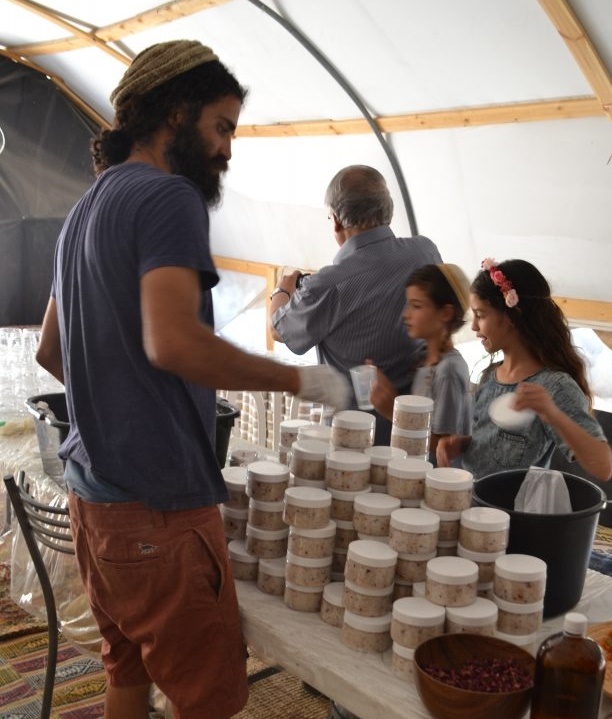
It was after Shlomit and her family moved to Bat Ayin that a chance encounter created the impetus for Shlomit to start producing her own organic cosmetics. Shlomit recounts that about 11 years ago, her husband Tomer, who was running a survival training camp for the boys in their community, became sick and was unable to continue leading the camp. He asked Shlomit to take over the camp that day and to teach the kids something special.
Shlomit took the opportunity to first teach the boys about a variety of plants and to then gather those plants with the boys. Together, they started a small fire, extracted nature’s remedies from the plants and created a cream to be used as a natural remedy. “All of the plants had remedies that were good for the skin,” Shlomit recalls. She wrote the cream’s remedies on the jars that the boys used to take the cream home. Within a couple days, Shlomit started to get calls from the mothers of the boys. They said, “We want to come and get some more of the cream from you, how much is it?” Shlomit responded, “I don’t have any, I just made some for the kids.” The parents encouraged her to produce the cream so that they could purchase more of it from her. They told her that her cream was magical – it cured many ailments that they couldn’t find cures for previously. Shlomit then began to make a career out of her passion.A year or so ago, Shlomit made her first product for Lev HaOlam. Shlomit told us that she really believes in what she is doing and was so happy to learn that people as far as the US would be using products created in Bat Ayin and the surrounding countryside. She was excited that this would give people from around the world a way to connect with us. In addition, Shlomit mentioned several times how inspired she gets by the power of many people working together toward a common goal.
“This year, in addition to being thankful for large order of products from Lev HaOlam, from people across the world, Shlomit is also thankful that she will be able to spend more time with her children. In particular, she is thankful to be close to and to provide care for her five year old, who recently suffered from a rare foot disease that required him to undergo six surgeries to date. When Shlomit learned of her son’s ailment, she stopped her full time producing of organic cosmetic. She wanted to be with her son to help him through the first of what would be 6 surgeries. She also told us about how the cost of the procedure was exorbitant – something she couldn’t afford – and that the procedure would require her to fly to the United States to have it done. Upon finding out about the Cohen’s predicament, the community of Bat Ayin started an online fundraising campaign that managed to surpass the amount needed for the trip and the surgery. In addition to the love and support from the Bat Ayin community, the US doctor that was to perform the surgery on Shlomit’s son, upon hearing the Cohen families story, decided to fly to Israel and to perform the surgery here. For Shlomit, this was another example of what amazing things can be achieved when people from all over the world come together toward a common goal.
Before we left Shlomit’s house to head back home, Shlomit gave us a message to share with the Lev Haolam subscribers: “I want to thank God for all of you that are taking part in this great project. It is very important and it gives strength to all of us. And not just for me, but when I tell my friends about my work with Lev HaOlam, they get excited about the support that we are getting from all over the world. All the time, we see the television and hear the voices of those who oppose us, but I know all over the world there are so many people that love and support us. Thank you.”
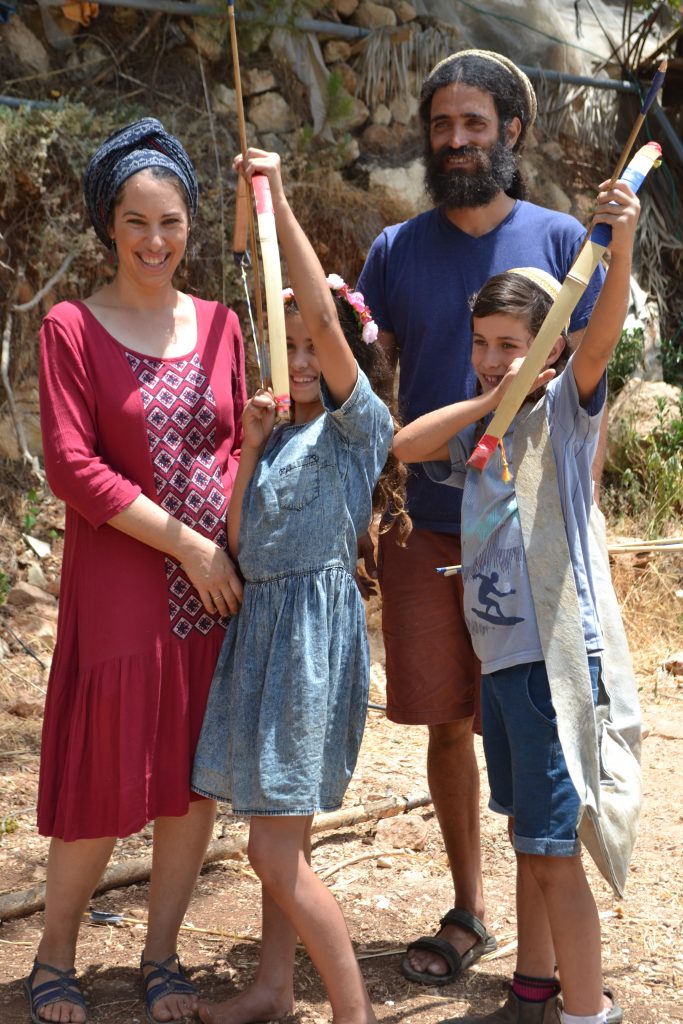
Shlomit’s message was both simple and touching in a way that we hope resonates with all of you. Shlomit invites our subscribers to come and visit her; to see the beauty of Bat Ayin, to meet the people, and to experience the land. She wanted all of us to know that she feels that it is a big privilege to live in Bat Ayin and raise her children there. Shlomit wants to share her blessings with all of Israel’s supporters around the world.
Would you like to help support the families and small businesses of Judea and Samaria? Consider signing up for the Surprise Monthly Package Project today.
EXCLUSIVE: From Judea to the Golan Heights to Samaria: The Journey of Boaz Netanel
October 25, 2017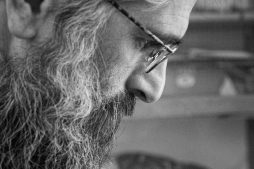
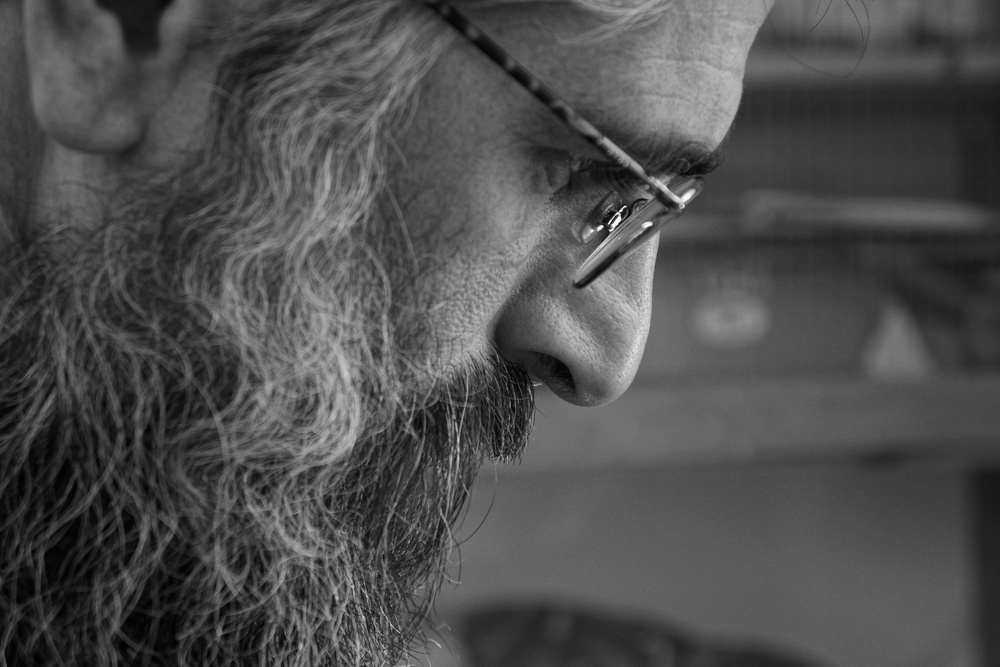
It has been approximately 15 years since my last trip out to the Shiloh region of Samaria. I fondly remember that first trip, visiting a beautiful family living on the hilltop community of Shvut Rachel, for Shabbat. However, this time I was with my colleague from Lev Haolam to meet with one of our suppliers, Boaz Netanel, who is the owner and manager of Aley Tamar Jewelry. While driving through the winding roads of Samaria, I was taken by the beautiful views, the vast hills and valleys.
Upon entering Eli, the community where Boaz lives, a beautiful panorama brimming with vast rolling hills could be seen ahead of us. Boaz was already waiting outside to greet us. He would later point out the view of the nearby community of Shiloh – the place that the Mishkan (Holy Tabernacle), the precursor to the Temple, first rested in the land of Israel. Pondering the name of his community, I inquired where the name Eli came from. Boaz smiled and enthusiastically answered that his hometown name was inspired by the name of the Biblical priest Eli, who had served and administered in the ancient tabernacle. With the great view and the overwhelming feeling of awe, I stood in this place, the place our forefathers first established Jewish worship in Israel. It was my first time in Eli and I already felt the responsibility and honor of participating in our people’s history… and our people’s future.
Boaz ushered us into his house with a warm smile. After we were properly introduced, Boaz began to tell me about his journey. I learned that he is no stranger to the life and the beautiful views of the Judean and Samarian hilltop communities. As it turns out, he grew up in Alon Shvut in Gush Etzion. Shortly after his marriage to his wife, Tamar, they relocated in the North- to Alonei Habashan in the Golan Heights, which is located on Israel’s Eastern border with Syria. Alonei Habashan is the easternmost community in all of Israel.
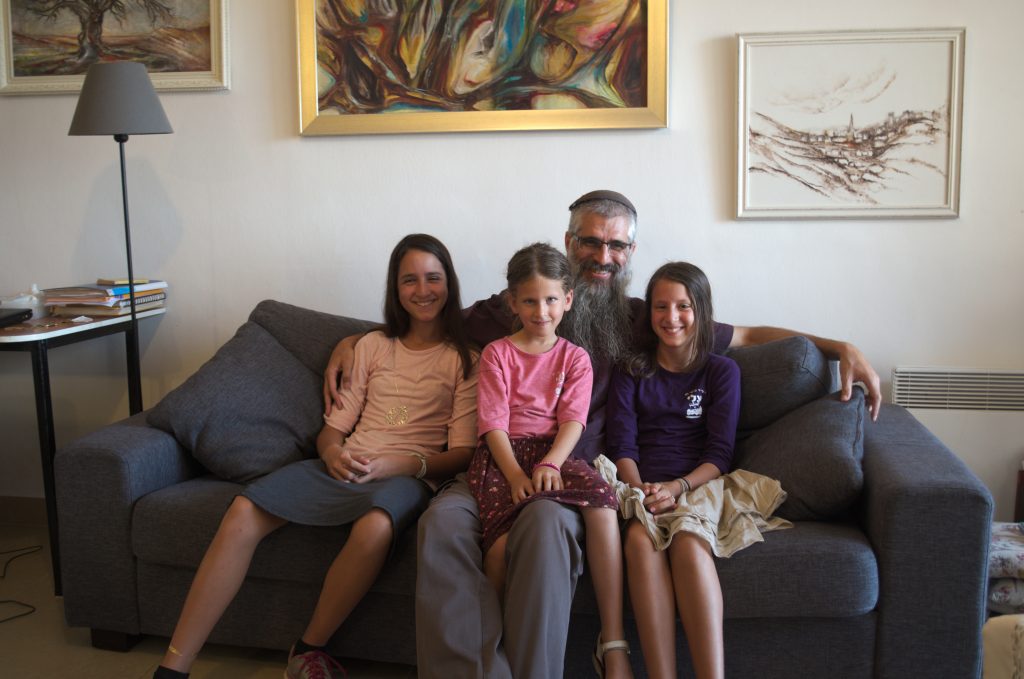
Boaz with 3 of his children
In Alonei Habashan, Boaz was a part-time farmer and a high school teacher for teenagers with learning disabilities for 6 years. From Alonei Habashan, he and his family moved to Kibbutz Sde Eliyahu (a farm co-op), in the Jordan Valley. Boaz continued to teach Torah, only this time, to retired army veterans.
“After 7 years in Sde Eliyahu I felt that I had enough [of teaching as a profession],” Boaz said. “I felt that I was doing so much talking, but was lacking in doing physical work. It was then that I began to notice the army veterans heading to the the study hall each morning after they had finished working the fields. Their faces glowed with a certain happiness and I understood how important it was for a person to be engaged in physical work. I then decided that I too would attempt to do the same for myself.”
Boaz relayed that he was not sure where life would take him next, but he was certain that he wanted to make more use of his hands in his next profession. Given that the kibbutz mandated that Boaz contribute to the collective community, and he no longer wanted to teach, Boaz asked to remain on the kibbutz just long enough to find a new home for him and his family. The kibbutz agreed to allow Boaz to stay an additional year as he found his path.
“I remember sitting underneath a tree near my house and just thinking. I never did this, sitting and reflecting about life and where I was headed. It was then and there that I decided that I wanted to do something with my hands, that I was going to take up jewelry making. I said to myself, this isn’t what I am used to, I have never been an independent professional my whole life.”
“In the past, when I worked with metal, it really spoke to me,” Boaz recalled. He then elaborated. He spoke about a trip he went on to visit Alonei Habashan, the community in which he spent his newlywed years. It was there that the local Rabbi said he thought jewelry making would be fitting for Boaz.
After a demonstration of how jewelry is made from a cast, Boaz explained where the concept for the jewelry piece featured in Lev Haolam’s October package originated. “The concepts that I tend to use for jewelry include plant life and history. I really like to use historical concepts,” he explained. “I sent some suggestions related to the Holy Temple to Lev Haolam.”
He continued, “during the Second Temple, during the period of King Herod, there were two huge entrances to the Temple Mount that were created for the pilgrims who came to worship there. There were four large engraved ceilings to these entrances. The top of one of these ceilings was the inspiration for the jewelry in this month’s package.”
Wondering about the times of the Temples in Jerusalem- where Boaz gleaned his inspiration- and then drifting back to the hilltop I had just seen, where the Tabernacle once stood, I asked Boaz why he decided to settle down in Eli. He responded, “We knew that we wanted to live in the hills and we searched for a place that was more or less in-between my parents, who live in Gush Eztion and my wife’s parents, in the Golan [Heights]. We looked for a place in the Binyamin region to live.” (The Binyamin region refers to communities that are within the portion of Israel that were allotted to the tribe of Benjamin in the bible.) And after visiting the community just twice, Boaz decided that Eli was the right place for him and his family.
While getting ready to leave and make our trip back to Jerusalem, Boaz told us that he wanted the following message to be sent to the members and supporters of Lev Haolam: “I think my wife and I put a lot of love into our products; a lot of love and joy. And through the jewelry [that I have created] I hope to be successful in connecting many people, both Jewish and non-Jewish, to the land of Israel and Jerusalem. And if I can, through the jewelry [that I created], manage to connect their love and their appreciation with the land of Israel, then this would be a small merit for me and it would make me very happy. And may it be that a love for the land of Israel and the Jewish people will be spread.”
Lev Haolam Packages Presented to Israel Defense Forces (IDF) Soldiers at Judea and Samaria Jubilee Celebration
October 1, 2017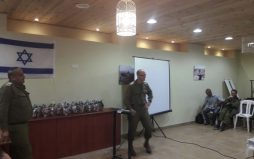
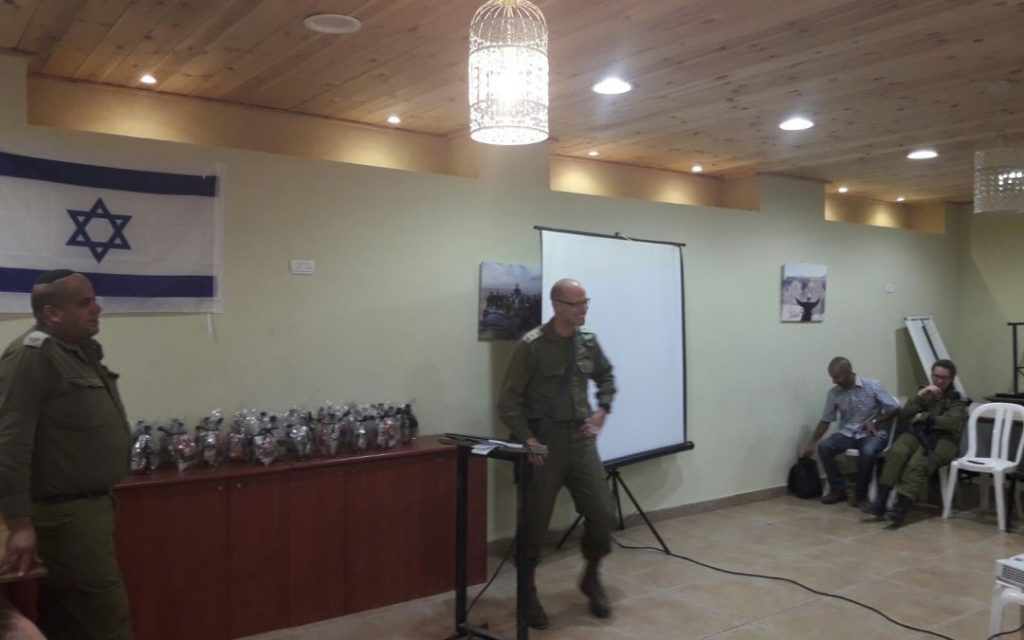
Pictured above is IDF commander Sharone Asman speaking with soldiers stationed in the Gush Etzion region.
At a ceremony in the Gush Etzion (Judea) region of Israel – in commemoration of the jubilee or 50 year anniversary of the return of the Jewish people to the Judea, Samaria, the Golan and the Jordan Valley areas of Israel – soldiers who are currently serving in the Israel Defense Forces (IDF) received packages from Lev Haolam. These soldiers held senior positions in the IDF and were presented the gift packages by the Gush Etzion regional commander, Sharone Asman.
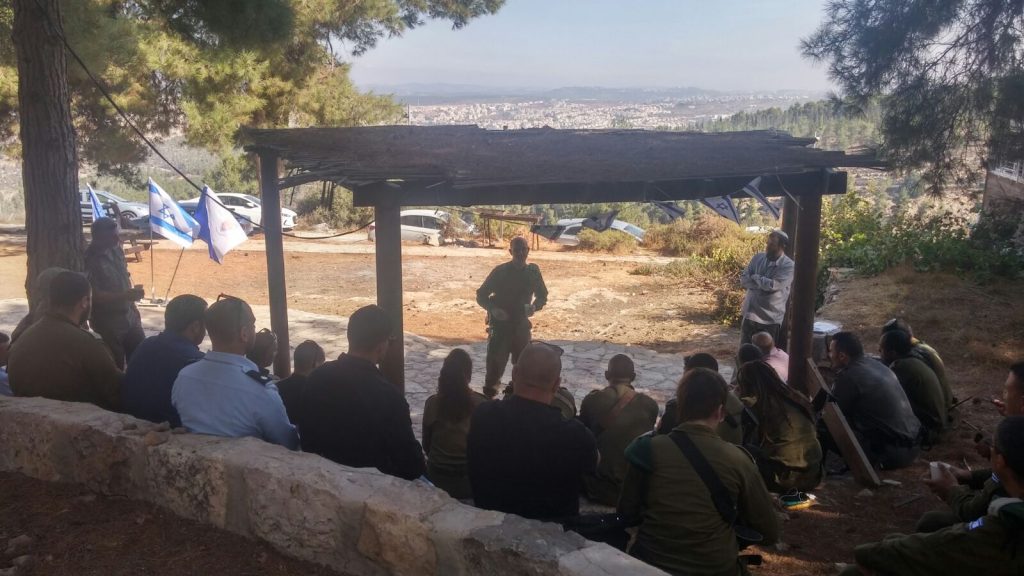
The IDF specifically wanted to present the soldiers with packages assembled and arranged by Lev Haolam so as to match the message and theme of the event. Since the ceremony marked the jubilee of Jewish life in Judea and Samaria, Lev Haolam – a company whose mission is to promote products produced in Judea and Samaria – seemed like the most natural fit.
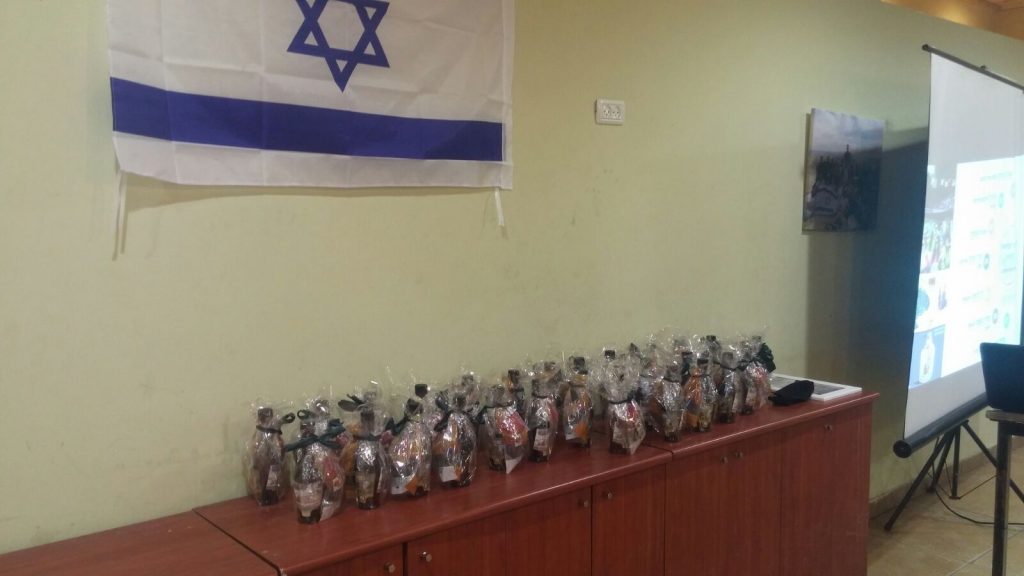
At the ceremony, Israeli Prime Minister Benjamin Netanyahu reiterated a promise he had made just over a month ago. Netanyahu remarked, “I tell you clearly and before anything: There will be no more uprooting of communities in the Land of Israel!”
Lev Haolam thanks the brave and courageous young soldiers who watch over and protect the citizens of Israel and civilians in need internationally. (Currently, the IDF is engaged in foreign missions to help other countries and nationalities. Click here to read about the recent IDF delegation sent to Mexico to assist the victims of a catastrophic earthquake there.)
Negohot Honey and A Sweet New Year From Lev Haolam
September 18, 2017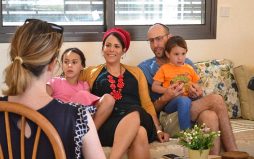
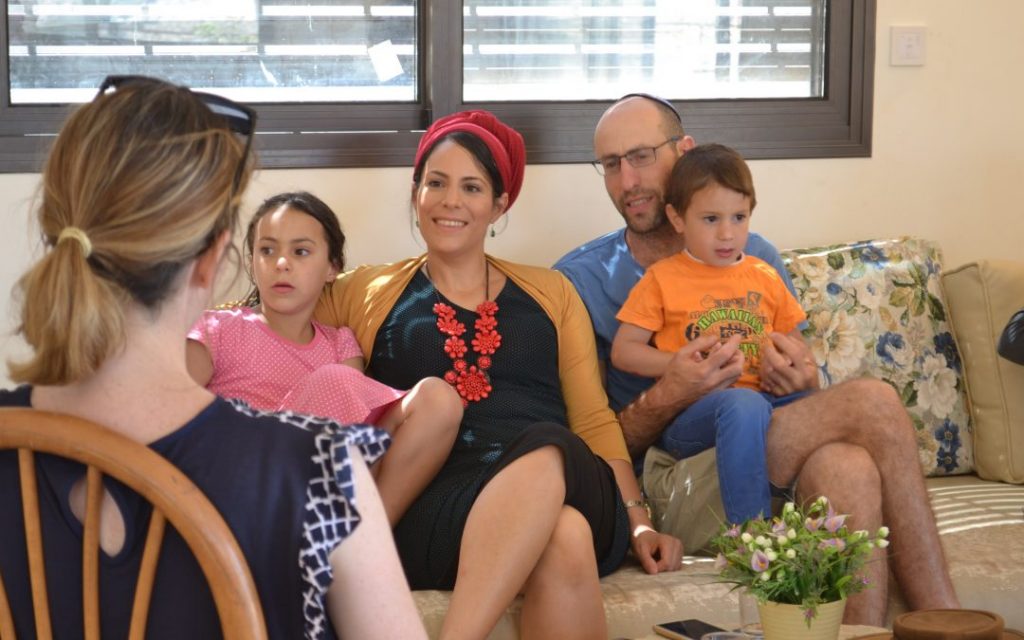
Recently, we had the privilege of meeting a wonderful family living in the small community of Negohot (Judea). Negohot is just a few kilometers from the holy city of Hebron and is located on a remote hilltop in the Judean mountains. My collegues at Lev Haolam and I went to Negohot to meet Shimrit and Baruch Foychtvanger, the founders of Negohot honey. We got to hear the story of how the Foychtvanger’s made it to the community of Negohot and about how Negohot Honey was started. Negohot Honey was one of the products in the September package from Lev Haolam.
When we sat down with Shimrit and Baruch to hear about their story, we began by hearing about the process of making honey and then about what makes the Negohot honey process so special and unique. Shimrit explained that when bees gather pollen to eat, they end up carrying pollen from one plant (the male species) to another (the female species), thereby giving the second plant the means to grow. “Plants can [also] be pollinated naturally by the wind” adds, Baruch.
Baruch continued to explain, “the main part of the what a bee eats are the nectar and the pollen. The nectar serves as the carbohydrates for the bee. And the pollen is the protein for them. And these are the 2 primary food groups for bees. Bees are animals that have not changed their behavior for thousands of years. They get up in the morning and to look for the pollen and nectar which is found in nearby plants.” Baruch uses the technique of cross pollination to help farmers grow their plants. He explains that he “takes the bee hives at the end of the winter, around February time, and moves them to sit near almond plants, and then to cherry plants, then to avocadoes… and from plant to plant to pollinate them.” The bi-products of the nectar and pollen which are eaten by the bee becomes the honey. This is how Shimrit and Baruch can produce different flavors. Each flavor is developed by harvesting the honey which is produced by pollen and nectar of specific plants.
Unlike Negohot honey, commercially sold honey usually has a small range as far as taste, Baruch explained. This is because, commercial manufacturers often create honey by feeding bees a sugar-water solution
which is used to produce a cheap and consistent honey. This honey generally is more sugary, less healthy and of course has less of a range of taste with which to appreciate honey. Neghohot honey is unique in that the honey comes from bees that have been fed carefully selected nectar and pollen. This selection and feeding process produces a variety of distinct honey flavors. (Some of the other flavors include Avocado flower, etc…) Another unique characteristic of Negohot honey is that the honey is not heated before packaging. Baruch explained to us that heating the honey dulls its flavor and can minimize the nutritional benefits of the honey and therefore Negohot honey is not heated.
When we asked about the history of Negohot honey, Baruch explained to us that his father was a bee farmer and had taught him the art of honey making at a young age. “My father has been a bee breeder for over 50 years and I too wanted to be a bee breeder” Baruch said. “When I was growing up, during my vacations (from school), I would try and help out [my father] in raising the bees.” Slowly but surely, Baruch continued to study farming, further enhancing both his farming and honey making skills. Today, Baruch and Shimrit bring their children into the honey trade and Baruch is proud to pass on the tradition of farming and honey production to their children. In addition to the honey produced at Negohot, the Foychtvangers are also looking forward to harvesting their first grapes, from their vineyard which rests on a patch of land about 100 meters down the hill from their house.
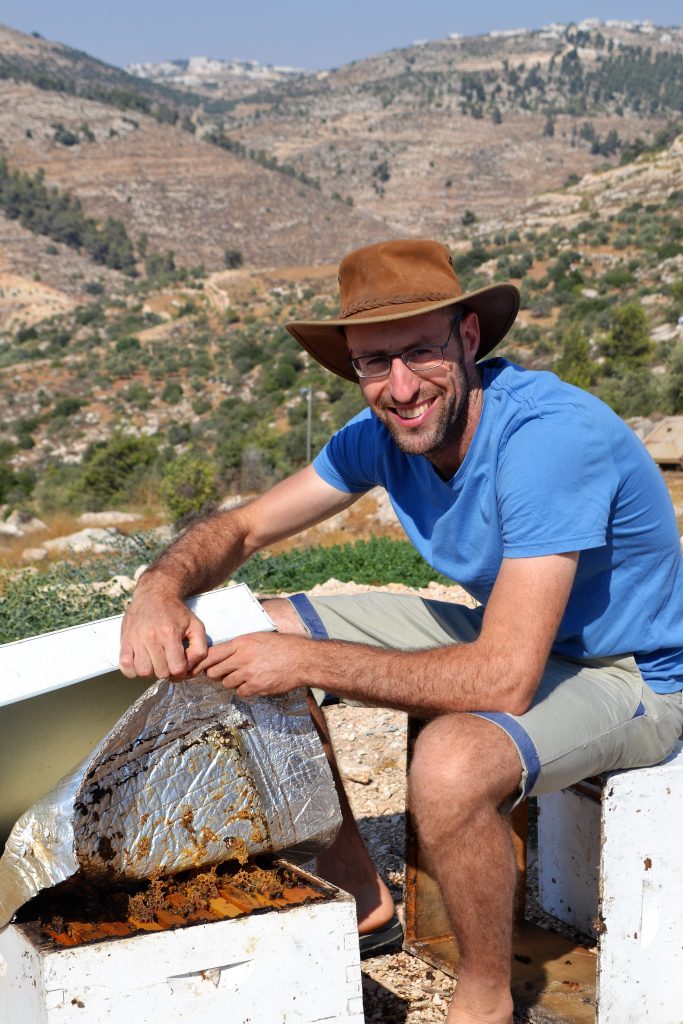
Hearing Baruch explain the choice for the name Negohot (established in 2006), we felt inspired and proud to be a part of what Negohot represented. The name Negohot comes from the Hebrew word Nogah, or “ray of light”. Negohot means “many rays of light” or as Baruch explained, Negohot are rays of light that have been filtered.
Baruch explained that when choosing the name for the honey company, he wanted the world to be exposed to the community of Negohot and that he wanted his work to resemble a shining light to others; a light with which to showcase the beauty of the Israel’s heartland, Judea and Samaria. He wanted to inspire others with his life’s work, which is intrinsically attached to Israel’s heartland. Shimrit’s message to Lev Haolam’s partners was equally inspiring and timeless in its nature. “I know that this [transaction] is not just a sale. I feel a special happiness since there is a connection that is created between Lev Haolam partners and us. I feel that there is an appreciation and a backing; that there are people that appreciate what we are doing.”
From the Lev Haolam family to you and yours, we wish you a happy and sweet new year!
Happy Rosh Hashana
September 13, 2017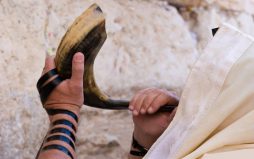
by Aviva Morris | Sep 13, 2017 | blog, Company News, Israel, Judea and Samaria
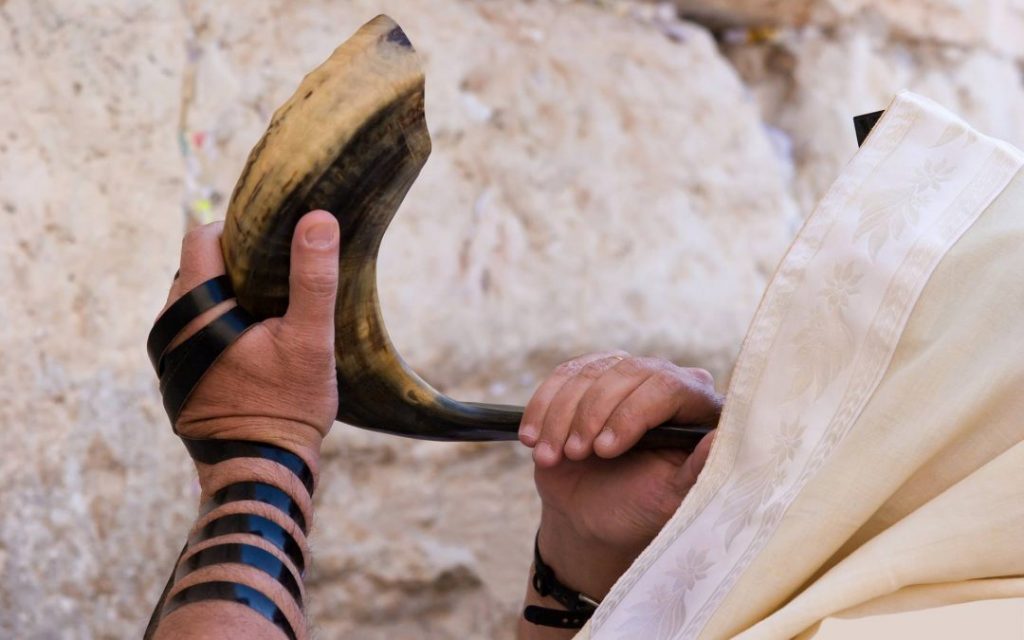
The Jewish people have had a tradition, dating back thousands of years, to eat sweet foods in celebrating the start of Rosh Hashana, the Jewish new year. (With Rosh Hashana right around the corner, we hope our partners and supporters have started to receive our special High Holiday Packages from Lev Haolam!) These sweet treats are meant to herald a wonderfully sweet New Year.
In addition to eating sweet foods, we also incorporate the following customs:
- Refraining from various forms of physical labor (similar to the Sabbath).
- Dressing in formal clothing out of respect and reverence for the day.
- Sounding/blowing the shofar-horn. The shofar generally comes from the horn of a ram.
- Reading from select portions of the bible that relate to the laws of the day.
- Greeting one another with wishes for a Shanah Tovah, a Happy New Year!
Rosh Hashana is also a time in which we both reflect on the previous year and make goals or resolutions for the upcoming new year. With that in mind, let’s take a look at some of the news and events (some good and some bad) from the previous year.
Anti-BDS Highlights from the news:
- In July, Christian United for Israel (CUFI) held their Washington summit with some 5,000 pro-Israel activists in attendance. Pastor John Hagee spoke loud and clear, saying BDS is economic antisemitism and put his support behind pushing measures to expand anti-Israel efforts.
- Munich joined the fight against BDS. City Council Members submitted the “Against every form of antisemitism– No cooperation with the antisemitic BDS movement” bill, which prohibits the municipality from funding or hosting BDS-related activity.
- Not long after Munich, Frankfurt’s deputy mayor submitted a similar anti-BDS bill.
- The Canadian governed backpedaled after a week of protest and outpouring of pro-Israel support, when they tried to ban wines from Judea and Samaria.
- Jerusalem Wine Festival Attracts Thousands, Features Wines from Judea and the Golan Heights.
- Legislators from at least 22 States in the United States of America sign laws or executive orders banning state business with companies that support the Boycott, Divestment and Sanctions movement, or BDS, against Israel.
- After mounting pressure from BDS activists including Roger Waters and Ken Loach, Radiohead decides to play a well attended show in Tel Aviv’s Hayarkon Park.
- The large organization known as MLA, or Modern Language Association of America, rejects the BDS movement.
- Friends of Judea and Samaria in the European Parliament together with residents of Samaria sign declaration to stop terror and fight BDS.
Israel and the World:
- Despite the devastating news revolving around the hurricanes in Houston and Florida, we are able to find light in the darkness as humanity comes together. In one instance, it was a private Israeli citizen, residing in Houston, who saved an elderly couple trapped in their home. In another, it was an entire EMS team flying in advance of the Hurricane Harvey to provide psychological first aid.
- In another, separate, display of solidarity with the United States and hurricane victims, an 8-member Israeli coalition, comprised of members of The Israel Rescue Coalition (IRC) and United Hatzalah (UH) Search and Rescue team flew to the United States to assist victims of Hurricane Irma.
- Wok began on the community of Amichai (Samaria). The completion of Amichai will mark the first Israeli community to be built in the Judean and Samarian regions of Israel in 25 years.
- The Samaria Council and Israeli Prime Minister Netanyahu celebrate 50 years since the return of Jewish life to Samaria. Netanyahu pledges to never uproot another Israeli community in Judea and Samaria.
- Arabs throughout Israel riot in protest of security cameras that are placed on the Temple Mount entrance to protect worshipers and security personnel. The addition of the cameras came as a result of an Arab attack days earlier in which 2 Israeli security officials were shot and murdered by Arab gunmen. The cameras, after much debate, were removed from the Temple Mount entrance.
- In July, the UN’s world heritage body (UNESCO) recognized the old city of Hebron as “a Palestinian world heritage site in danger.” This came on the heels of a decision by UNESCO to condemn “Israeli actions” in Jerusalem and reject Israel’s sovereignty over the city.
- Arab vandals destroyed 10 dunams (2.5 acres) of vineyards next to the town of Esh Kodesh, near Shiloh, in Samaria. Esh Kodesh is also the home to Nati Rom, the founder of Lev Haolam, and his family.
Rosh Hashana is a 2 day holiday and this year will begin at sundown on Wednesday, 20 September and will go till sundown of Friday, 22 September. As we enter this new year, consider helping us fight BDS and support small businesses in Israel by becoming a member of Lev Haolam’s Surprise Monthly Package Project. Not only will you undertake a new, meaningful endeavor, but you will also receive beautiful boutique goods connecting you directly to the land of Israel! It has been a wonderful year and we are looking forward to sharing this upcoming year with all our supporters and members in good health, happiness, and peace. Happy Rosh Hashana and Happy New Year!
What’s Inside A Surprise Monthly Package from Lev HaOlam?
June 27, 2017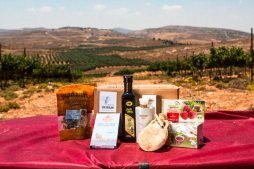
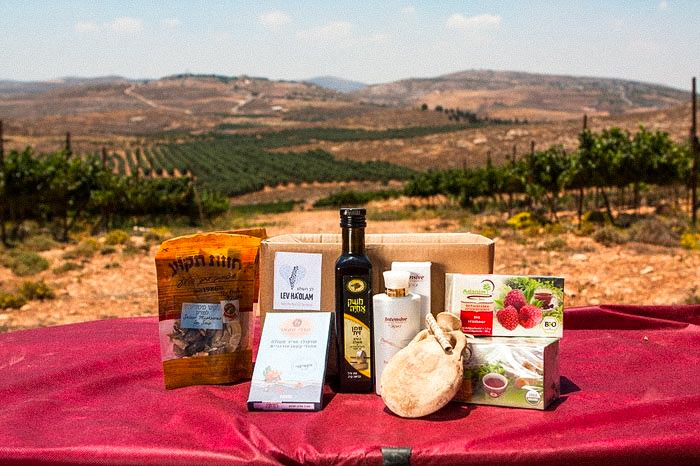
For those of you who haven’t heard about our Surprise Monthly Package Project, let me take a minute to explain a bit more about the “story” behind the monthly packages before getting into what’s inside of the packages.
The Surprise Monthly Package Project Story
About 4 years ago, Nati Rom, who lives in a small Jewish village near Shiloh decided to take upon himself the fight against the Boycott, Divestment, Sanctions (BDS) movement. “We saw that there were no efforts using the story of Judea and Samaria to combat the boycott movement working so hard against us,” Nati said. Nati’s practical response to the boycott was to buy products from small retailers on Israel’s front-lines, in Judea and Samaria and the Golan Heights, who suffer from the international boycotts and then help market their products around the world. Today, we are proud to say that we are currently the biggest buyer in Judea and Samaria. We have customers from dozens of countries including Sweden, the Netherlands, Norway, Germany, Singapore, Australia, and the United States.
The people who subscribe to our Surprise Monthly Package Project are ensuring that large orders of products will be placed with the pioneers of Judea and Samaria. Subscribers who partner with Lev HaOlam receive a beautiful package at their doorstep every month; a package filled with products made by families and small businesses in Judea, Samaria and the Golan Heights .
What’s Inside Each Package?
Inside each monthly package, our subscribers receive approximately 6 to 8 unique items that are produced by companies specially within the Judean, Samarian, and Golan Heights regions, who have have been boycotted by the international community. The products in each package vary every month, but can include honey, tea, wine, oils, chocolates, spices, dried fruits and vegetables (many of which are organic), organic cosmetics, Judaica items, jewelry, decorative and handmade artisan crafts, various household items, and much more.
Where Can I Sign Up?
To sign up for our Surprise Monthly Package Project, please click on our Become A Member page.
Can I See Some Products From Previous Packages?
To see a sample of previous products that we have included in our packages, please click on the Explore Our Products page.
Who Produces the Products?
To see some of the producers of our products and for some truly inspiring videos, please click on the Meet The Pioneers page.
Can I Meet Nati?
Nati frequently travels internationally to speak with Israel supporters around the world. To find out where Nati will be speaking next, be sure to like visit our Facebook page and click on the Events tab.
I Still Have Some Questions, How Can I Get in Touch?
For the fastest response to any questions you may have, please send an email to support@levhaolam.com. If you would like to get in touch by phone, please see the list below for the best number to use:
Office Number (Israel): 02 3721 384
US Phone Number (Customer Service): (531) 2081 263
The Gem of Judea
May 29, 2017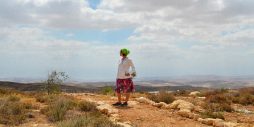
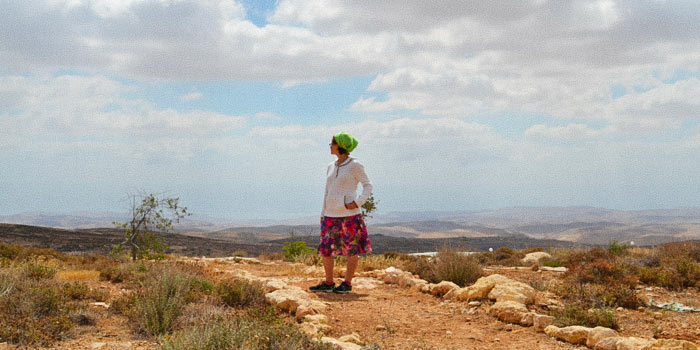
On our way to meet this month’s producer, we drive along a winding road between olive trees and vinyards and climb up a steep mountain where a gem of the Judean Desert is revealed: Pnei Kedem.
This hilltop is the home to 50 idealistic families who built their houses, planted their trees and paved the roads of their village with their own hands.
We meet Tamar Rund in front of her house, as she greets us with a smile and a hot beverage. Even on a warm spring day, the winds of Pnei Kedem are cooling.
She invites us inside to a beautiful living room that is covered with oil paintings of Judean landscapes. “My daughters picked those paintings from my collection” she smiles, “they like having a changing exhibition in the house”.
Tamar, 33, was only few months old when her parents decided to leave everything they knew and loved in the United States, to move to Israel. “In a way I am happy they made this decision for me,” she says, “it is not an easy thing to do, and I am thankful to live here, in Israel.”
Tamar’s parents started their new life in Efrat, Gush Etzion and were a vital part of Efrat’s development. So it was only natural that Tamar wanted to follow their footsteps. After meeting her husband Eitan, they began the search for their dream house. “We both wanted to find a place where we could play an important role in establishment and development. This was the case with Pnei Kedem”.
“When we arrived there were only 24 families here and we had to take an active part in building the community.” They planted the trees outside, raised money for cultural activities and took part in whatever was needed.
“Right now I am the chairman of the security committee here. It is a very small place, without even a supermarket or a community center, which means that we really have to be there for each other as a community – all the time”.
Tamar’s fascination with art started in High School. “I came one day to my parents and told them I would like to be an artist. I was very nervous about their reaction but to my surprise they were very supportive and encouraged me to pursue my dream.”| She received her B.Ed. in Emuna College in Jerusalem and then an MFA from an online college in San Francisco. Tamar mostly paints the gorgeous landscapes of Judea which she fell in love with in her childhood; she also paints the portraits of her neighbors and friends. “The people that live here are very interesting, I like painting them.” She also teaches art in a boys’ high school in Kiryat Arba to which she travels twice a week.
Tamar and Eytan moved to Pnei Kedem eight years ago and live in their humble, cozy house together with their four daughters. In response to our question about the difficulties in living on a hilltop in Judea she responds with yet another smile and mentions the roads that are not very safe due to the aggression of the Arab neighbors who attack the Jews with rocks and Molotov cocktails. “Only last week a family from here was attacked with Molotov cocktails that were thrown at their car: it was a miracle nobody got hurt”. It is not always simple living in a small village in Judea but Tamar and Eitan view this as their obligation and privilege. “Living in Israel is what we should do, this is our land.”
But these are not the only challenges the Runds had to go through this year.
Eytan, who works as a tour guide turned unwillingly into a hero after responding quickly and efficiently to a ramming terror attack. On January 8th four soldiers were killed, and 17 were wounded, when a flatbed truck driven by an Arab terrorist rammed into a group of soldiers that was guided by Eytan.
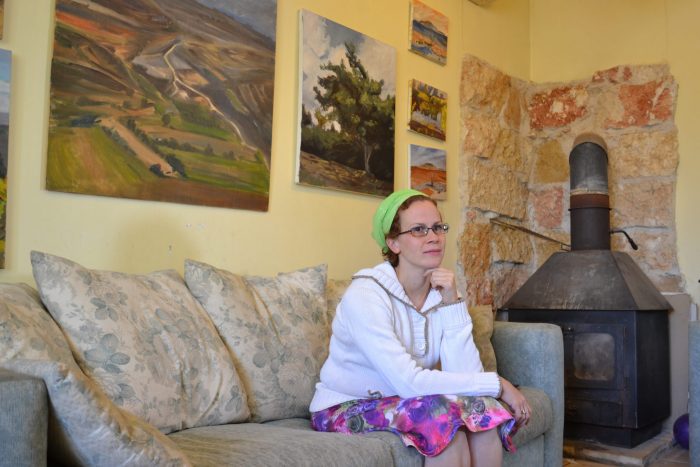
“My husband is a tour guide who likes guiding tourists but mostly he enjoys guiding solider groups. As he was instructing everyone to put their bags back on the bus – a truck came and hit him. The terrorist killed the soldier he was talking to instantly and my husband was thrown back, he rolled on the grass. He was surprised to discover he could get up and understood it was a terrorist attack and right away ran to shoot at the terrorist; he just shot his whole magazine and shortly was joined by others. A few seconds later, the truck stopped.”
Tamar takes a long pause before continuing. This episode has clearly not been easy on the family. The kids still worry about their father going to work. “It was really a matter of few centimeters between life and death. Eytan suffered some minor injuries to his legs. The first thing he said to me on the phone was – I am okay, I can walk, I am not paralyzed. I was just at a terrorist attack but I am really okay.”
Now Eytan is back at work, doing what he enjoys most – guiding young soldiers and teaching them about their heritage and roots.
Tamar continues with her art work and hopes that you will enjoy her print that is included in this month’s package. It is one of the breathtaking landscapes of Gush Etzion.
“I am very happy to do what I love” Tamar concludes.
Healthy Cookies
May 28, 2017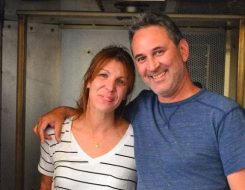
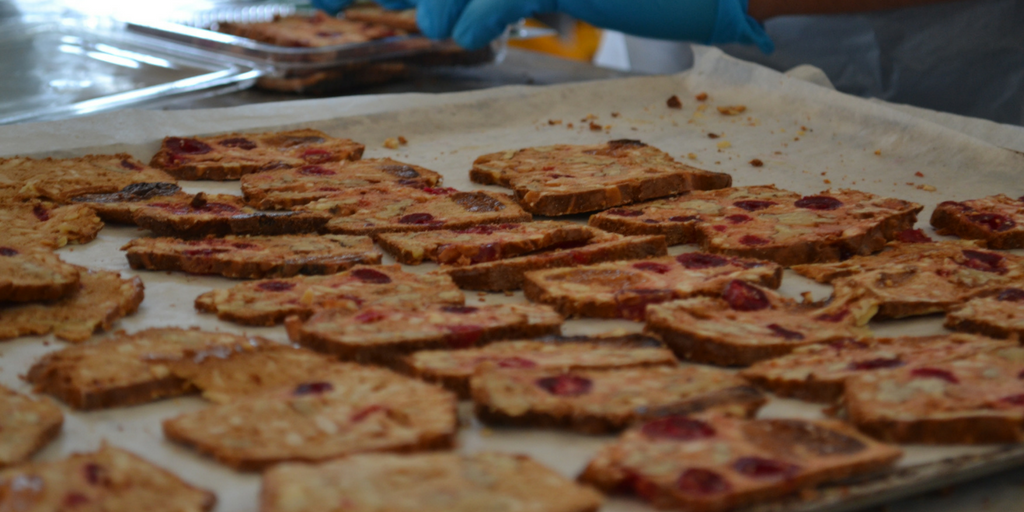
Office Manager turned Confectioner in Response to her Husband’s illness
As we enter this large space inside one of the buildings in the in the capital city of Gush Etzion, we smell the delicious aromas of fresh pastries, cinnamon, cocoa and chocolate. This is the new home of “Rachel’s Cookies”, a family business.
Several employees roll the dough, grind nuts, mix them with dates and spices, prepare the fillings and cut the ready cookies into pieces. While packing is done by a machine, almost everything else is done manually. “And you can feel free to taste them” says Uriel Mekhaber, Rachel’s husband and business partner. “The pastries taste different when they are made by hand. The fact that a given set of cookies in one box can come in different sizes, gives you a sense that the cookies are homemade. We like it and will stick to it.”
Rachel and Uri got married in 1998, and became business partners in 2007, soon after Uri was diagnosed with Crohn’s disease.
“He had to keep a very strict diet – no sugar, no gluten, no starch…. I started to cook for him, and invented my ‘energy snacks’ – dates and nuts bars, which later got the brand name of Pinukei Ha-Teva (‘Natures Treats’). Everyone who tried them seemed to like them, and people started to tell me, come on, you need to open your own confectionery bakery… So eventually that’s what I did.”
Rachel’s Cookies working space was first situated in a 10-meter room in Uri’s mother’s apartment in Jerusalem, which they rented from his uncle…
“The fridge, the oven, the worktop – you could reach everything without needing to move, which was quite energy-saving,” Rachel laughs.
Rachel would do the baking during the night, and Uri used to get up at 6 am to go over the cafes and stores nearby with a large bucket of cookies, pleading the owners to try the product. Both Rachel and Uri worked full-time at their primary jobs at that time; Rachel as office manager, and Uri as wine distributor, while also raising a child.
Over the course of the following ten years, they had two more children, Rachel took a course in pastry arts in the Hadassah academic college in Jerusalem, Uri quit his job and became the CEO of their new business, and the family moved from Jerusalem to the community of Har Gilo. Then, finally, in February 2017 they rented a brand-new large space for the bakery in the industrial zone in Efrat.
Uri says now that they can produce more in the new space, they will begin to sell more, because demand is higher than supply.
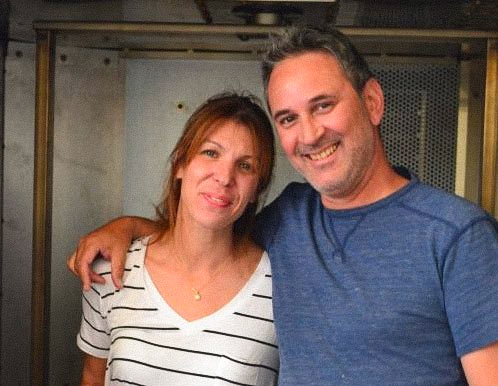
As David continues to speak, Rachel shows me a video clip featuring an Israeli minister buying her cookies in a store in Jerusalem. The president’s house, they say, orders the cookies, too.
“I just went with the flow,” Rachel says, “and eventually it turned out to be a good strategy… Kids, studies, work, business – I did everything simultaneously. It has been a bit crazy, very tiring – but cool.”
